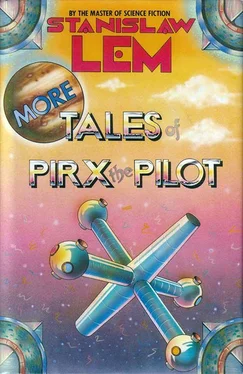He seemed somehow unconsoled. By now, I’d had it with psychotherapy and preferred to work on the operator instead—that is, to cut him off from his liquor supply for at least a couple of hours, which the alert now made more urgent than ever. We were well inside Venus’s perimeter, a heavily traveled zone; traffic, and not only of the cargo variety, was fierce. I kept a four-hour watch by the transmitter, the radiotelegraph operator at my side, until 0600 hours—fortunately, without picking up a single distress call. The swarm was so low in density it took literally hours of squinting to detect it: a mass of microscopically small greenish phantomlike dots that might easily have been an illusion caused by eyestrain. Meanwhile, tracking stations on Luna and on Earth were projecting that the hyperbolic swarm, already christened Canopus after the radiant’s brightest star, would bypass Earth’s orbit and abandon the system for the same galactic void whence it had come, never to menace us again.
The civil engineer, more anxious than ever, kept nosing around the radio room. “Go back and man the controls!” I would bark. A purely cosmetic command, of course, first because we had no thrust, and without thrust there’s no navigating, and second because he couldn’t have executed the most rudimentary maneuver, and I wouldn’t have let him try. I just wanted to keep him busy and out of my hair. Had I ever been caught in a swarm before? How many times? Had there been any accidents? Were they serious? What were the odds of surviving a collision? He kept up a steady stream. Instead of answering, I handed him Krafft’s Basic Astronautics and Astronavigation, which he took but I’m sure never opened: the man craved first-hand revelations, not facts. And all this, I repeat, on a ship minus any gravity, weightless, when even the soberest of men moved in burlesque fashion—when, for example, the pressure exerted in writing with a pencil could land a man on the ceiling, head first. The radiotelegraph operator, however, coped not by belting up but by jettisoning things: trapped in the space between ceiling, deck, and walls, he would reach into his pants pockets, throw out the first item at hand—his pockets were a storage bin of miscellaneous weights, key chains, metal clips—and allow the thrust to propel him gently in the opposite direction. An infallible method, unerring confirmation of Newton’s second law, but something of an inconvenience to his shipmates, because, once discarded, the stuff would ricochet off the walls, and the resulting whirligig of hard and potentially damaging objects might last a good while. This is just to add a few background touches to that idyllic voyage.
The airwaves, meanwhile, were jumping, as passenger ships began switching to alternate routes. Luna Base had its hands full. The ground stations that relayed the orbital data and course corrections were firing away signals at a clip too fast for the human ear to detect. The relays were also jammed with the voices of passengers who, for a hefty fee, were cabling reassuring messages to loved ones. Luna’s astrophysics station kept transmitting updates on the swarm’s more concentrated areas, along with spectroanalyses of its composition—in a word, a regular variety show.
My mumps-stricken crew, already informed about the hyperbolic cloud, kept phoning in to the radio room—until I switched off the intercom system. I announced they would recognize any danger—a blowout, say—by the sudden loss of pressure.
Around 2300 hours, I went below for a bite to eat. The radiotelegraph operator, who must have given up waiting for me, had vanished meanwhile, and I was too tired to hunt him down, much less think about him. The engineer returned from his watch, calmer and more visibly troubled by his brother-in-law than by the swarm. On his way out of the mess, when he wasn’t yawning like a whale, he mentioned that the radar’s left screen must have shorted, because it was showing a sort of green flicker. With these words he made his exit, while I, who was in the process of polishing off a can of corned beef, my fork stuck in an unappetizing gob of solid fat, fairly froze.
The engineer knew radar about as well as I knew asphalt. A radar screen “shorted”…!
A moment later, I was streaking to the cockpit (in a manner of speaking, of course, because I could accelerate only by shinnying with my hands and by bouncing, feet first, off the walls and overhead deck). The cockpit—when I finally reached it—was dead, its dashlights extinguished, its reactor controls like fireflies, and only the radar screens were still going, pulsating with every sweep of the scope. My eye was already on the left-hand one before I was inside the hatch.
The lower-right quadrant showed a bright, immobile dot, which, when I came closer, became a coin-sized splotch, somewhat flat and spindle-shaped, perfectly symmetrical and fluorescent-green in color: a tiny, deceptively motionless fish in an otherwise empty ocean. If an officer of the watch had spotted it—not now, but a half hour earlier—he would have flipped the automatic tracking relay, alerted his CO, and requested the other ship’s course and destination. But I was without any watch officers, a half hour too late, and alone. I did everything at once: sent out the identification call, switched on the tracker, and fired up the reactor (it was as cold as a very old corpse) in order to have instant thrust ready at hand. I even managed to get the navigational computer going, only to discover that the other ship’s course was almost parallel to ours, with only a marginal difference between them, so that the chance of a collision, extremely low to begin with, was pushing zero.
But the other ship played deaf. I shifted to another chair and began flashing Morse from my deck laser. It was too close for comfort, about nine hundred kilometers astern, and I could see myself being hauled before the Tribunal for violation of Paragraph VIII: “HA = Hazardous Approach.” But only a blind man could have missed my signal lights, I told myself. Meanwhile, that ship sat stubbornly on my radar, and not only did it not alter course, but it was actually starting to lap us—we were moving, as I said, on almost parallel tracks—along the quadrant’s outer perimeter. I visually clocked its speed at roughly hyperbolic, or ninety kilometers per second, which was confirmed by two readings taken within a ten-second interval; whereas we were lucky if we were doing forty-five.
Still no response; it was gaining, and it looked splendid, even elegant. A pale-green, incandescent lens, which we viewed sideways; a smoothly tapered spindle. Suspicious about its size, I glanced at the radar range-finder: we were four hundred kilometers away. I blinked. Normally a ship looked no bigger than a comma from that distance. Damn—I thought—nothing works aboard this ship! I transferred the image to a small auxiliary radar with a directional antenna. The same effect. My mind went blank. Then a sudden brainstorm: another of Le Mans’s convoys, a string of some forty-odd hulks in tow… But why the spindle shape?
The scopes went on sweeping, the range-finder kept clicking away. Three hundred, two hundred sixty, two hundred…
I checked the course margin on the Harrelsberg because I smelled a near-collision in the making. When radar was first introduced at sea, everyone felt a lot safer, but ships went on sinking just the same. The data confirmed my suspicions: the other ship would clear our bow by some thirty to forty kilometers. I tested the radio and laser relays. Both functional, but still no response. Until now, I had been feeling a trifle guilty—for leaving the ship on automatic while I sat below and listened to the engineer bellyache about his brother-in-law, snacking on a can of corned beef because I was without a crew and had to do everything myself—but no more. Now it was as though the scales had fallen. Filled with righteous indignation, I knew who the guilty party was: this deaf-mute of a ship, too hell-bent across the sector to respond to another pilot’s emergency signals!
Читать дальше












